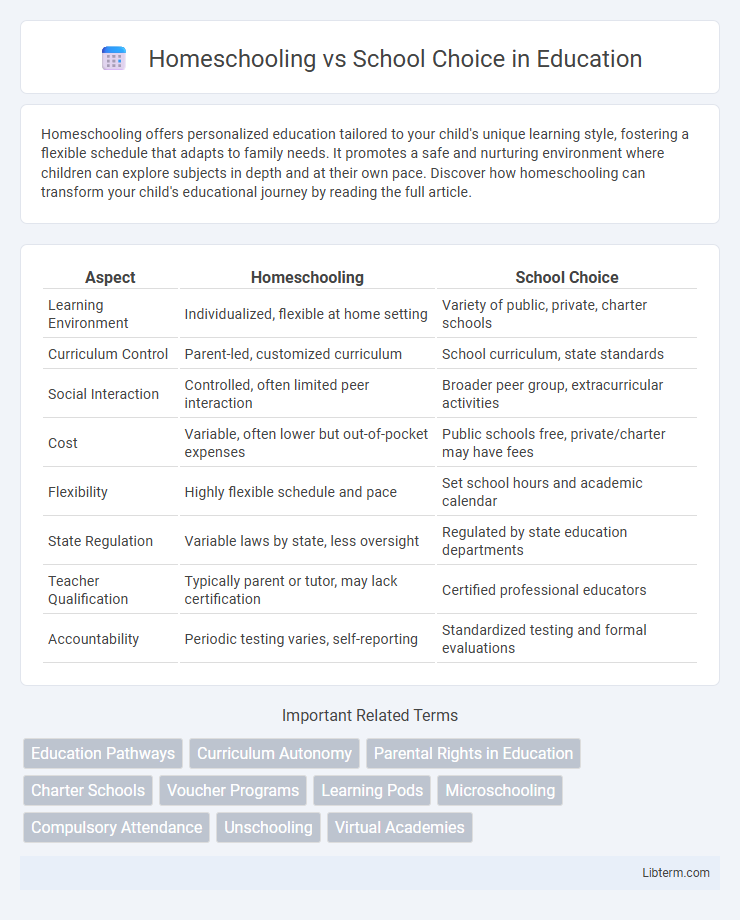Homeschooling offers personalized education tailored to your child's unique learning style, fostering a flexible schedule that adapts to family needs. It promotes a safe and nurturing environment where children can explore subjects in depth and at their own pace. Discover how homeschooling can transform your child's educational journey by reading the full article.
Table of Comparison
| Aspect | Homeschooling | School Choice |
|---|---|---|
| Learning Environment | Individualized, flexible at home setting | Variety of public, private, charter schools |
| Curriculum Control | Parent-led, customized curriculum | School curriculum, state standards |
| Social Interaction | Controlled, often limited peer interaction | Broader peer group, extracurricular activities |
| Cost | Variable, often lower but out-of-pocket expenses | Public schools free, private/charter may have fees |
| Flexibility | Highly flexible schedule and pace | Set school hours and academic calendar |
| State Regulation | Variable laws by state, less oversight | Regulated by state education departments |
| Teacher Qualification | Typically parent or tutor, may lack certification | Certified professional educators |
| Accountability | Periodic testing varies, self-reporting | Standardized testing and formal evaluations |
Introduction to Homeschooling and School Choice
Homeschooling allows parents to tailor education to their child's individual needs, offering flexibility in curriculum and pacing outside the traditional classroom setting. School choice policies enable families to select from various public, private, charter, or magnet schools, promoting diverse educational opportunities within the school system. These options address different learning styles and preferences, empowering parents to make decisions that best support their children's academic and social development.
Defining Homeschooling: Methods and Approaches
Homeschooling encompasses various methods such as traditional, classical, Montessori, and unschooling, each tailored to individual learning styles and family values. It emphasizes personalized education plans, flexible scheduling, and a strong parent-teacher role to foster academic and social development. These approaches contrast with school choice options that include magnet, charter, and private schools, which provide alternative public or private school environments without full home-based instruction.
Understanding School Choice: Options and Models
School choice encompasses various educational options including charter schools, magnet schools, voucher programs, and open enrollment policies, providing families with alternatives beyond traditional public schools. These models empower parents to select schools that align with their children's specific learning needs, cultural values, or specialized programs such as STEM or arts-focused curricula. Understanding the diversity and availability of school choice options enables families to make informed decisions about their child's education and promotes tailored academic experiences.
Academic Outcomes: Homeschooling vs School Choice
Academic outcomes in homeschooling often demonstrate higher standardized test scores and improved parent-reported student engagement compared to traditional public schooling within school choice programs. Research from the National Home Education Research Institute indicates homeschooled students typically score 15 to 30 percentile points above public school peers on standardized assessments. School choice options such as charter schools and voucher programs show mixed results, with some studies highlighting modest gains in math and reading, but overall outcomes varying widely depending on program quality and student demographics.
Socialization and Student Development
Homeschooling offers personalized learning environments that can enhance socialization through targeted group activities and community engagement, while traditional school choice provides diverse peer interactions crucial for developing social skills and emotional intelligence. Research indicates homeschooled students often excel in self-motivation and critical thinking, yet may require structured social exposure to foster collaborative teamwork and conflict resolution abilities. School choice programs balance academic freedom with access to extracurricular activities, promoting well-rounded student development in both cognitive and social domains.
Parental Involvement and Responsibility
Parental involvement in homeschooling requires direct responsibility for curriculum design, daily instruction, and progress assessment, fostering a highly personalized educational experience. In contrast, school choice allows parents to select from various public, private, or charter schools but places instructional responsibility primarily on institutional educators. Both options demand active parental engagement, yet homeschooling intensifies parental accountability for educational outcomes and compliance with state regulations.
Cost Comparison: Financial Implications
Homeschooling typically incurs direct costs such as curriculum materials, educational supplies, and potential loss of parental income, while traditional school choice options may include tuition fees, transportation, and extracurricular expenses. Public school choice often minimizes out-of-pocket costs but might involve indirect expenses like school supplies and activity fees. Evaluating financial implications requires analyzing both explicit costs and opportunity costs to determine the most cost-effective educational option for families.
Legal and Regulatory Considerations
Homeschooling regulations vary significantly by state, often requiring parents to submit curriculum plans, maintain attendance records, and comply with periodic assessments, while school choice policies typically involve legal provisions allowing parents to select public, private, or charter schools under voucher or scholarship programs. Legal considerations for homeschooling emphasize parental rights balanced against state interests in educational oversight, whereas school choice laws navigate issues of funding allocation and school accountability. Understanding these regulatory frameworks is crucial for families determining the most compliant and beneficial education option.
Customization and Curriculum Flexibility
Homeschooling offers unparalleled customization and curriculum flexibility, allowing parents to tailor educational content to individual learning styles, pace, and interests. School choice programs provide options such as charter schools and private schools that often feature specialized curricula and adaptive teaching methods, though they may still adhere to state-mandated standards. Both approaches empower families to select or design educational experiences that best align with their child's unique needs and academic goals.
Making the Right Education Choice: Factors to Consider
Evaluating homeschooling versus school choice requires considering factors such as curriculum flexibility, socialization opportunities, and personalized learning needs. Homeschooling offers tailored instruction and adaptable schedules, while school choice provides access to specialized programs and diverse peer environments. Parents must assess their child's learning style, family resources, and long-term educational goals to determine the most effective path.
Homeschooling Infographic

 libterm.com
libterm.com